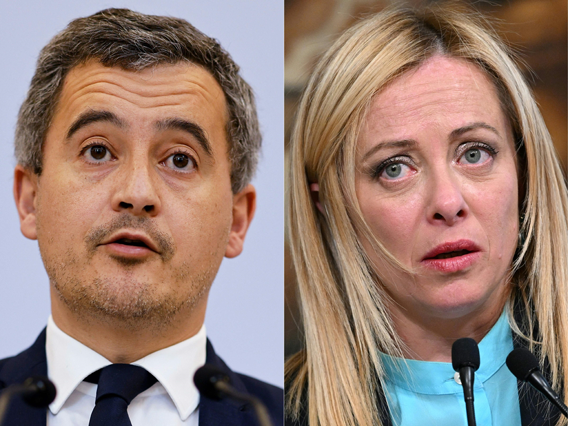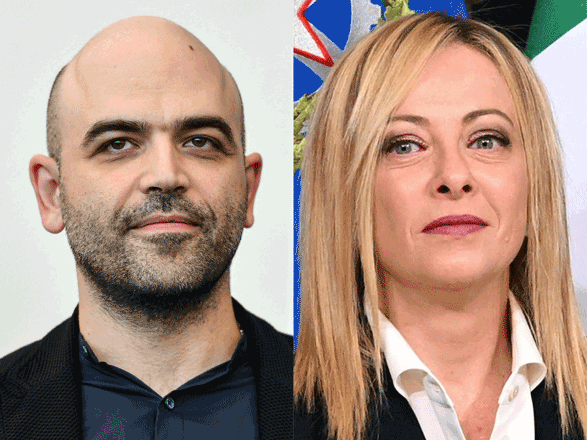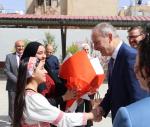You are here
Right-wing nationalists rising — and divided — as EU vote looms
By AFP - Mar 10,2024 - Last updated at Mar 10,2024
BRUSSELS, Belgium — Right-wingers pushing nationalist and Eurosceptic policies are rubbing their hands ahead of EU elections in June.
Voter surveys show growing support for their platforms, which will likely translate into bigger influence over the bloc’s political agenda.
However, a closer look reveals deep splits in the right-wing camp — especially over attitudes toward Russia — that would prevent a united front.
In the European Parliament, far-right forces are settled into two political groups which are mostly rivals and have failed at attempts to join together.
One is the European Conservatives and Reformists (ECR). The other is the Identity and Democracy group (ID).
“ECR is pro-Ukraine, pro-enlargement, pro-NATO. ID is ambivalent about Russia, anti-Atlanticist, anti-enlargement,” explained Peggy Corlin, analyst at the Robert Schuman Foundation.
ECR counts Brothers of Italy, Italian Prime Minister Giorgia Meloni’s far-right party, in its ranks, along with Spain’s Vox, Poland’s populist Law and Justice (PiS), and France’s Reconquete!.
ID is made up of France’s National Rally (RN) whose face is Marine Le Pen, as well as Italy’s League Party, Germany’s anti-immigrant AfD, Austria’s FPO and Geert Wilders’ PVV Freedom Party from The Netherlands.
“ECR is more integrated into the EU political game and in the institutional game,” Corlin said. It has two main figureheads: Meloni and Czech Prime Minister Petr Fiala.
ID, in contrast, has up to now been treated as something of a political pariah by the other parliamentary groupings.
“The group will take on more importance, to such an extent that I think they can no longer cut us out as they have done since 2019,” predicted one of its EU lawmakers, Jean-Paul Garraud of France’s RN.
Political alliances
However, even within ID there are tensions between those wanting it to appeal more to mainstream voters, as the RN is striving to do, and the likes of AfD -- which is suspected of harbouring neo-Nazi sympathisers.
Those tensions were laid bare recently when Le Pen publicly distanced herself from the AfD after reports that several of its leaders held a meeting with extremists in which they discussed massively deporting immigrants or Germans of foreign backgrounds.
“We want clarification about what happened, and especially the policies held by the AfD,” Garraud said. “We want to be in agreement with our allies.”
The likely bigger ECR and ID footprints in the parliament could create difficulties for the legislature’s three main groups: the conservative European People’s Party (EPP), from which European Commission chief Ursula von der Leyen hails; the leftist Socialists & Democrats (S&D); and the centrist Renew Europe.
The majority decisions those three managed to work out in the past could be upset on certain issues.
The EPP has not ruled out working with ECR — although von der Leyen recently warned she would never cooperate with Russian President Vladimir Putin’s “friends” or enemies of “the rule of law”.
That is an allusion to Fidesz, the party of Hungarian Prime Minister Viktor Orban, who maintains close ties to the Kremlin and has put obstacles in the path of EU aid for Ukraine. Fidesz is in talks to join ECR.
“Let’s see what that brings,” said Akos Bence Gat, an expert at the think tank MCC Brussels that is backed by Hungary’s government.
“For me, what’s important is for the sovereignist right-wing to be able to come together and form effective cooperation,” he said, adding that he saw scope for areas of agreement to defend “a Europe of nations” that upholds “traditional values” and battles “massive immigration”.
Internal rifts
But if Fidesz does join the ECR, that could prompt other parties in the group, such as Finland’s Finns Party, or the Sweden Democrats, “to reconsider their position”, noted Sanna Salo, a researcher at the Finnish Institute of International Affairs.
But, beyond the internecine rifts, “If there is a shift to the right... they can influence the agenda in other ways,” she said, for instance by pushing governments towards their restrictive migration and climate policies.
Already on migration, the EPP seems ready to embrace the far right’s stance: its latest manifesto vows to have asylum-seekers sent to “safe” countries outside the EU.
That echoes what Britain is trying to do under a deal with Rwanda, which has already run afoul of the European Convention on Human Rights, on which EU law in this area is based.
Related Articles
ROME — Italy's foreign minister cancelled a trip to Paris on Thursday after a French minister criticised Rome's migration policy, in a fresh
ROME — Italian anti-mafia journalist Roberto Saviano stands trial next week on defamation charges brought by Giorgia Meloni, now Italy's pri
ROME — Far-right leader Giorgia Meloni said Monday she was ready to govern for "all Italians" after her eurosceptic populists swept to victo


















